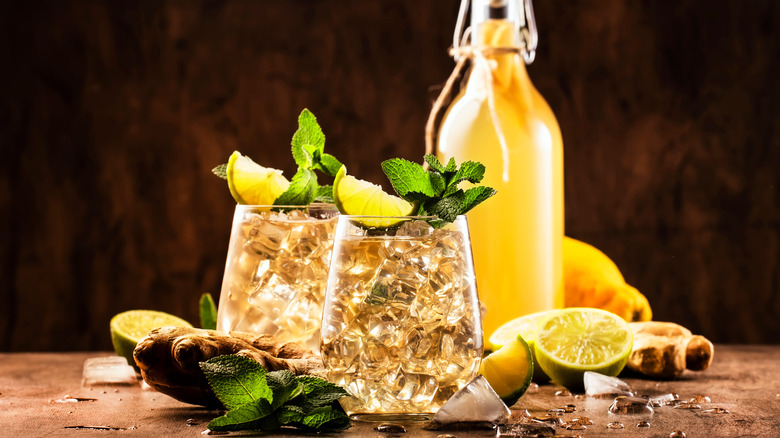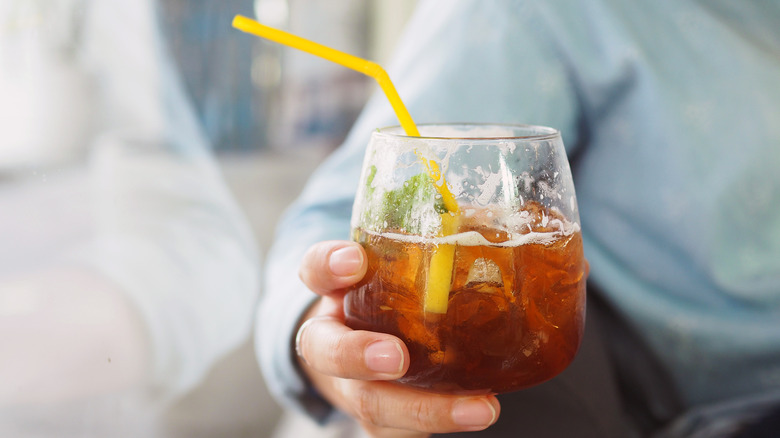Is Ginger Ale Good For You?
Ginger ale is widely used as a mixer for cocktails, but it also tastes good on its own. It was actually the most popular soft drink in the U.S. during Prohibition, notes The Atlantic. In the mid-19th century, people used it as a natural remedy for nausea, vomiting, and indigestion. These potential health benefits are attributed to ginger, its main ingredient. Ginger root contains over 115 bioactive compounds with antioxidant, anti-inflammatory, antiemetic, and anticancer properties. Some studies suggest that it may prevent nausea, suppress tumor growth, and improve diabetes symptoms (via Herbal Medicine: Biomolecular and Clinical Aspects).
This beverage was traditionally made with ginger, sugar, and carbonated water. However, its composition has changed over the years. "If you actually look at the ingredients, it may not have ginger listed," Dr. Brett White told The Atlantic. On top of that, ginger ale is often loaded with sugar, high-fructose corn syrup, and preservatives. A single bottle can have over 43 grams of added sugar, depending on the brand (per My Food Data). So, does ginger ale have any benefits or is it just marketing hype?
Ginger ale has no nutritional or health benefits
Ginger has been used as a food and medicine for thousands of years. Research confirms its beneficial effects in the treatment of nausea, vomiting, irritable bowel syndrome, dysphagia, and delayed gastric emptying. Moreover, this root supports liver health and may protect against colon cancer, reports a 2019 review published in Food Science and Nutrition. Given these aspects, it's not surprising that many people reach for ginger ale to soothe an upset stomach.
Unfortunately, store-bought ginger ale has no nutritional or health benefits. As the Cleveland Clinic notes, many brands don't even use actual ginger. In 2018, Canada Dry was sued for making false marketing claims. Back then, the company used the phrase "Made from real ginger" to promote its bubbly beverage. "They do buy actual ginger, but then what they do is they boil it in ethanol, and that essentially destroys any nutritional or medicinal benefits," explained attorney Mark C. Canofari (via CTV News).
It may cause bloating and gas
Ginger ale can do more harm than good, Dr. Matthew Goldman told the Cleveland Clinic. First of all, this bubbly beverage contains carbonated water and may cause bloating. Second, it's loaded with sugar or artificial sweeteners. Most brands contain at least 10 teaspoons of sugar, warns Dr. Goldman.
Sugar and artificial sweeteners feed the bad bacteria in your gut, which can worsen indigestion (via Cooking Light). Some sugar substitutes, such as sorbitol, may cause diarrhea, gas, bloating, and loose stools, according to a 2019 case report published in the journal Canadian Family Physician. Therefore, diet ginger ale isn't necessarily a better option.
This doesn't mean you should never drink ginger ale again. Just make sure you consume it in moderation. A better choice is homemade ginger tea. Enjoy it warm or ice-cold, with a few mint leaves and freshly squeezed lemon juice. Dr. Goldman recommends using fresh ginger to relieve nausea and stomach pain. Simply add a couple of slices (peeled) to warm water or hot tea to reap the benefits.



